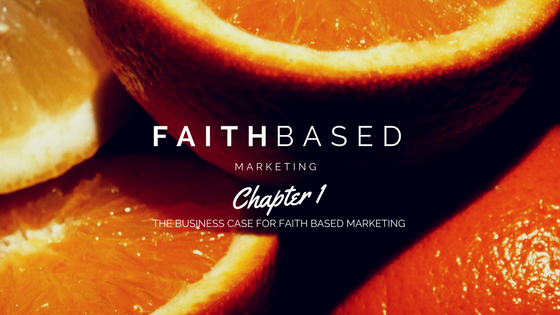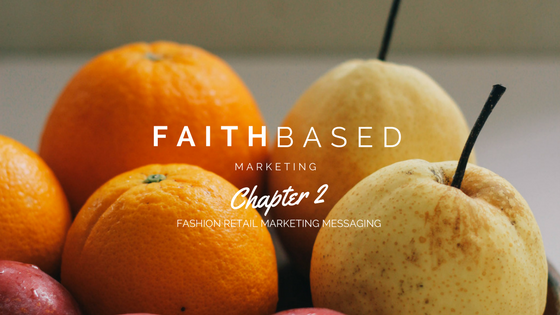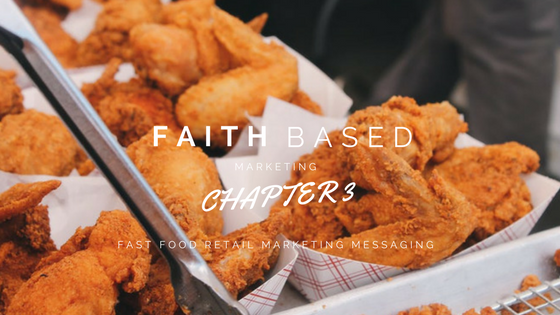Creating a faith-based marketing strategy that is founded on Christian perspectives offers a new way to connect and compel consumers, in some cases even creating a greater brand loyalty across generations of consumers. This article challenges conventional marketing messaging to arrive at a new paradigm and may be better suited for those who have a preliminary understanding the of the tenants of Christian faith. In this chapter, companies like Chik-Fil-A, Hobby Lobby, and Forever 21 are featured to see what these great brands are already doing with faith-based marketing. Get insights into how to use faith-based values to connect with people on a deeper level when marketing services and products today.
Executive Summary
- Faith-based or gospel-centered marketing is the most sustainable and meaningful way to engage consumers as people
- Each industry has their conventions, but there are unaddressed tensions that are resolved when we use faith-based marketing
- Fast food caters to a human's hunger, whereas gospel-centered marketing provides messaging that addresses deeper needs
- Fashion retail accepts people based on their exterior beauty, but the gospel provides a balanced perspective to engage all cultures and generations
- Education's marketing guarantees a future, but with statistics pointing to a more balanced perspective around knowledge as humility helps to point students in a more meaningful direction
Sales & Marketing ROI Podcast: Episode #50
The Faith-Based Marketing Business Case - Click the link below to listen to the podcast.
Listen to this podcast- click here
Subscribe our podcast now - click here
View a full listing of our podcasts - click here
Faith-Based Marketing Provides Robust Messaging that Engages all Demographics
There are a host of marketing agencies that claim they can help businesses use Christian faith to market their products. But to the keen eye, this itself flies in the very face of what it means to market based on values of the Christian faith, or gospel-centered communication: you're accepted, valuable, beautiful, worthwhile, and etc. NOT because of what you wear, buy, or drink, but as a result of the acceptance of God. We recognize that we are worse than we ever imagined but more accepted and loved than we ever dared hope (Keller). We will see in this series that this foundation leads to very different marketing messaging that speaks to a holistic individual rather than the compartments of needs and desires.
Faith-based marketing is incredibly nuanced and harder than it sounds. It's not only about expressing faithfully a marketing message that is founded on gospel principles but adapting it to give it the most impact. Here is why a marketer or company, whether they themselves embrace faith personally or not, should consider using faith-based marketing strategies:
- Faith-based marketing is the right thing to do - because it aims to ultimately meet the deepest longings that may only be temporarily addressed by products and services.
- Improves the culture of society - faith-based marketing provides a balanced perspective on every field of endeavour, tying it deeply to the handiwork of God in that there are great things about each culture, while also challenging the areas in which a culture is flawed (i.e. family honour killings, complete loss of independence in a patriarchal society, or loss of community from hyper-individualism).
- It provides the resources to questions customers ultimately have - ultimately it provides the most balanced view of the world of possessions, that they aren't our own and we're given a precious opportunity to use them well for the sake of God.
- It provides a message that engages all demographics - the gospel is a world movement rather than representative of one ethnicity, it has the capability to reach all audiences, industries, and sociodemographics. There is no other narrative that speaks as sharply and comfortably into every culture than the gospel.
Examples of Challenges and Impact in Marketing with the Gospel
There is also a widening gap between Christian and Secular marketers that claim to "get" faith marketing. This notion of "getting" Christian-focused marketing was most clearly illustrated in a CNN Christian quiz on the knowledge of Jesus. A majority of Christians would disagree that the survey is indicative of meaningful content around the person of Christ. Here are samples questions from the quiz like:
- What did Jesus eat at the last supper
- Where did Jesus ascend to heaven
- What was the primary language Jesus used
Unfortunately, these facts even if known aren't illustrative of the significance of Christ and show that there is still plenty of opportunity for dialogue on the significance of the gospel perspective that is centered on Christ. If the mark is completely missed even by recognized news outlets, the notion of secular companies understanding Christian perspectives should be suspect.
Lowe's Christmas Tree Backlash

Source: Dooby Brain
In 2011 Lowe's had changed their Christmas Tree product names in flyers to Family Trees, which triggered a backlash and outcry by their Christian customers. This led to Lowe's reverting the name and issuing an apology to customers that were affected and felt their traditions were being neglected. Now this example may actually speak more to American culture than the overall Christian sentiment. The disconnect here is that Lowe's wanted to avoid alienating other faiths but instead triggered the outcry of Christians. Christians also failed to point to this issue to the real truth of the gospel, but rather settled for a territorial victory rather than engaging in a deeper conversation around the inclusion of cultures being one theme of the Christmas narrative. If marketers are seeking to be inclusive there is no greater story or paradigm that brings together all people of nations and tribes (Revelation 7:9).
Chik-Fil-A uses Product and Marketing to Edge out Competitors

The burger and beverage company is open about its faith foundations and has even included Christian messaging in products such as children's meal toys. Even though its marketing is less overt, their business practices like closing all stores on Sunday in recognition of the 4th commandment speaks to Christians and non-Christians alike with its own message. It has also challenged conventional perspectives on Christians with humorous marketing campaigns like "Eat more Chicken" and "Cow Appreciation Day" which became a hit on social media. The business strategy of having a focused product line along with differentiated marketing messaging has to lead to Chil-Fil-A being able to maintain their prices while competitors are forced to try and win fickle customers with deals and coupons.
Some other implications of the core Christian narrative are that not only humans are important to God but the environment and all biological life. In that way, the gospel not only opens the way for Chik-Fil-A to imply cows having more significance than just being originators of burgers but further sets the table for messaging about sustainability and ultimately a restoration of the seemingly unrestorable ecosystem. The gospel not only is progressive but offers hope where all other narratives fall short or reduce issues and challenges to symptoms rather than root causes.
Marketing can Either Dehumanize or Foster Holistic People and Organizations
Conventional marketing, depending on the industry, will sometimes reduce individuals to a series of needs and wants, with marketing catering to these desires. Part of this is pragmatic in that marketing requires a simple message that targets a specific demographic. Yet the ongoing perpetuation of messaging along the lines of "beauty is only external" for example, whether spoken or unspoken, will ultimately dehumanize an individual because not everyone will look like the people on billboards. This isn't simply in the fashion or beauty industry, it is equally true in the fast food industry. The underlying message across endless scores of plump and juicy burgers and mouth-watering entrees leads to a reduction of the individual to their hunger or thirst and that they should function to satisfy these desires. Marketers have a prominent influence on culture and it is a responsibility that should be carefully considered before creating reductionistic messaging.
The challenge then, is how do we as marketers create a message that encourages people to be more fully who they are, either in the individual or corporate (communal) settings they belong to? Though this is a challenge, the alternative is much more grim, as we continue to cater to a compartment of a human, we become less and less human as we perpetuate and satiate these compartments rather than the whole person.
Pitfalls and Alternatives to Conventional Marketing Messaging
Fast Food: You are Your Hunger
Beyond serving a hunger or craving the brands become less relevant at other times of the day. The downside of this type of marketing is that it reduces people to their stomachs, and has necessitated greater food regulation around nutrition labeling because it actually isn't in the best interests of people to cater simply to their hunger or cravings.
The alternative is that food brings people together: one of the deep values of Christianity is that relationships are enduring whereas possessions are not. Relationships stay golden and the ultimate relationship is already available through the gospel. Marketers can embrace messaging that emphasizes how food and beverages inherently bring people together. Alongside that theme, brands can further differentiate themselves by identifying what their products are most associated with in terms of conversations and topics to be discussed.
A conventional food industry messaging that has taken off is the concept of fair trade or organic foods. Healthy food is important but just as significant is the process and supply chain that has brought the product to the table. The faith-based narrative also encourages a commitment to not only eating well because our physical being is given by a creator but also that we're to manage the finite resources on this earth because it's a gift from a cherished friend.
Fashion Retail: You are Only Worthwhile if You Look Like This...

Source: Fashion Rouge, Fashion Ad Explorer, Fashion Gone Rogue
In the fashion industry, there is a desire to be unique so that one can be affirmed and loved. in that way, the conventional messaging of fashion is that in order to be loved or noticed, you'll have to look good and stand out. The challenge to that is that your self-worth is based on the shifting preferences of those around you.
The departure comes as we appropriate Tim Keller's perspective on the gospel in that when we know we are deeply flawed yet also more loved than we can imagine, we have the resources to be truly fulfilled and affirmed. The bearings on fashion then, are that because of love and its natural expressions in beauty and creativity we can behold beauty not only in well dressed, thin, and tall people. There is a beauty to celebrate in every season. This provides a whole new dimension of fashion marketing that needs to be explored so that youth and our culture do not fall prey to a limited understanding of the basis of self-worth. See here for a deeper discussion on fashion retailing marketing, along with conventional pitfalls and alternatives.
Education: Your Future is Guaranteed if You Study and Make the Grade
With universities in Ontario marketing to an ever increasing body of students, the conventional message is that if someone is well educated then the future is certain. While further education is a good thing, saying that education ensures the good life sells is selling a message of false hope. CBC recently featured a new graduate who was surprised and dismayed that his degree didn't land him a meaningful career in the field of his study. This story isn't the exception but is instead a growing issue amongst new graduates. The conventional message that education always equals success needs be re-examined to encompass the new qualities and extracurriculars that are required for success in the modern world.
No matter if you are a skeptic or faith-based reader, a wary eye should be cast on anything that guarantees a future via an education program in itself. Educational adverts are pointing people to place their trust and faith in something, be it an education or career, to guarantee a successful and fulfilling future. They are not, however, showing that by itself an education is not a guarantee for success and happiness. Instead, these advertisements should be showing their formal education offering as just one part of an ongoing lifetime of learning that includes mentorship from others in the field, along with continued learning in many areas. Instead of selling a degree and saying that will career fulfillment, educational advertisers should advertise their programs as a part of a whole lifestyle that together has the possibility of career success.
Instead, these advertisements should be showing their formal education offering as just one part of an ongoing lifetime of learning and personal development that includes mentorship from others in the field, continued learning in many areas, and personal development. The advertisements should be less about selling a program while saying it will bring happiness and more about making a well rounded professional. Instead of selling a degree and saying that it will bring career fulfillment, educational advertisers should advertise their programs as a part of a whole lifestyle that together has the possibility of career success.
Faith Based Marketing is the Message that Lasts
Profitworks is committed to its faith foundations and looks to express it meaningfully for our clients to their customers as a way of serving everyone better. The gospel is rich in guiding a balanced perspective on self-image, relationships, role in the community, and engaging and resolving the tensions in the world around us. It is the most inclusive message.
We are continually striving for ways to help our clients compete using principles of our faith from our work to processes. By speaking to an entire individual and their true needs we are endeavoring to humanize the marketing industry by best serving those with whom we engage.
Our services include online content writing and A/B testing of messages and layouts to best engage individuals of faith backgrounds. The team also is comprised entirely of Christian professionals helping you understand the unique customer journey of individuals from secular and religious backgrounds.
"Our overall sales to new customers has improved as a result of detailed analysis, proposed solutions, and successful execution.”
-Tom - Business Owner & Customer

Become The Leader In Your Market
Other Articles You Might Be Interested In
 |  |  |  |
|---|